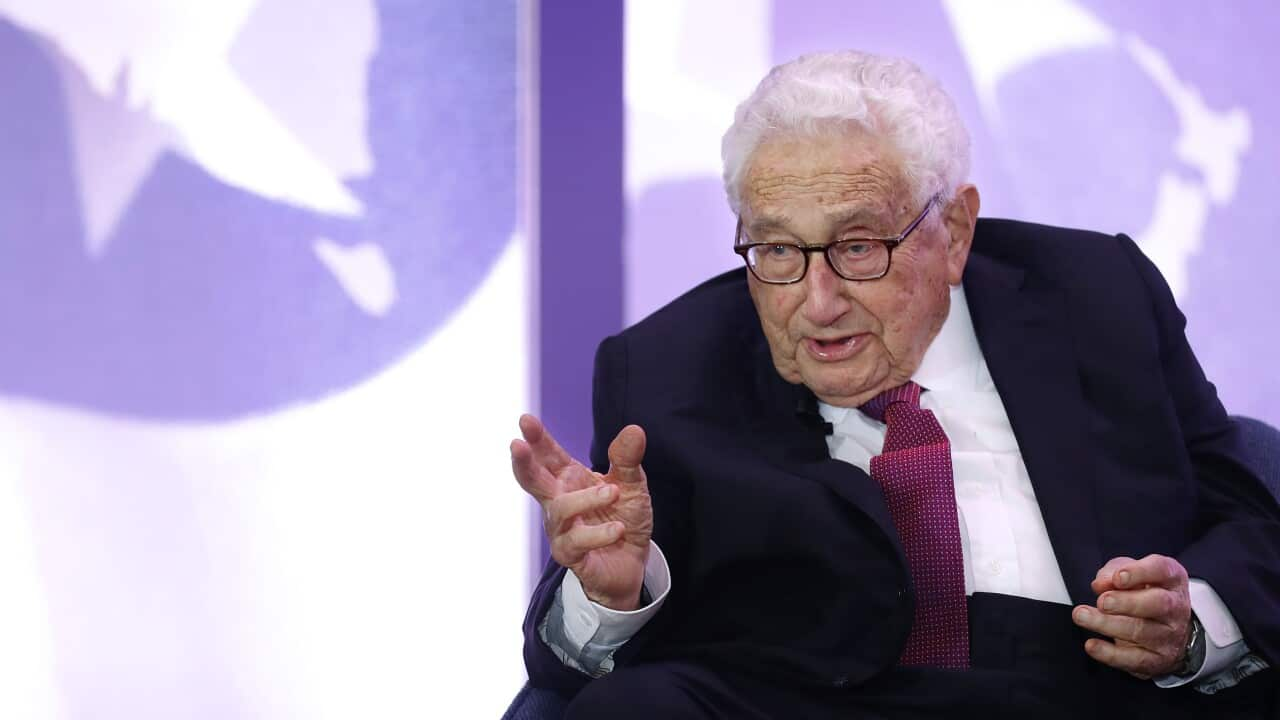Key Points
- Henry Kissinger served under two US presidents, Richard Nixon and Gerald Ford.
- The controversial 1973 Nobel Peace Prize was awarded to Kissinger and North Vietnam's Le Duc Tho.
- Kissinger was born in Germany and fled the Nazi regime with his family in 1938.
Henry Kissinger, a controversial figure who left a strong mark on US foreign policy as the country's secretary of state, has died at 100.
Lauded in the US for his work during the Cold War to improve relations with a then-isolated China, Kissinger leaves a different legacy elsewhere in the world.
He supported the regime of , backed Indonesia as it seized East Timor in 1975 and, along with Richard Nixon, was heavily criticised for showing support for Pakistan during the war with India in 1971.
Nixon and Kissinger also authorised a secret 1969-1970 bombing campaign in Laos and Cambodia aimed at disrupting rebel movement into South Vietnam during the war.
The bombing did not halt the infiltration, killed thousands of civilians and helped spawn the genocidal Khmer Rouge.
Kissinger was awarded the Nobel Peace Prize for negotiations to end the Vietnam War, even though the conflict did not immediately end and his North Vietnamese counterpart, Le Duc Tho, declined to accept the prize.
In response to this, singer and satirist Tom Lehrer famously said: "Political satire became obsolete when Henry Kissinger was awarded the Nobel Peace Prize."

The Watergate scandal that forced former president Richard Nixon (right) to resign barely grazed Henry Kissinger, who was not connected to the cover-up and continued as secretary of state. Source: AAP / AP
Who was Henry Kissinger?
Heinz Alfred Kissinger was born in Furth, Germany, on 27 May 1923, and moved to the United States with his family in 1938 before the Nazi campaign to exterminate European Jews.
Anglicising his name to Henry, Kissinger became a naturalised US citizen in 1943 and served in the army in Europe in World War Two.
After many years at Harvard University, Kissinger was brought to the White House as national security adviser by Nixon after winning the 1968 presidential election.
During his time in government, Kissinger's efforts led to the diplomatic opening of China, landmark US-Soviet arms control talks, expanded ties between Israel and its Arab neighbours, and the Paris Peace Accords with North Vietnam.
Kissinger's reign as the prime architect of US foreign policy waned with Nixon's resignation in 1974.
Still, he continued to be a diplomatic force under president Gerald Ford and to offer strong opinions throughout the rest of his life.
Scandals and controversies
While many hailed Kissinger for his brilliance and broad experience, others branded him a war criminal for his support for anti-communist dictatorships, especially in Latin America.
In his latter years, his travels were restricted by efforts by other nations to arrest or question him about past US foreign policy.
China was one of Kissinger's most lasting legacies. Hoping to shake up the Cold War fight against the Soviet Union, Kissinger secretly reached out to Beijing, culminating in a historic 1972 visit by president Richard Nixon and later the US establishment of relations with the then-isolated country, which has soared into the world's second largest economy and growing competitor with Washington.
While Kissinger was despised in much of the world, China's ambassador to Washington, Xie Feng, called Kissinger a "most valued old friend" and his death a "tremendous loss for both our countries and the world."
He also enjoyed deference across the political mainstream in the US, with incumbent Secretary of State Antony Blinken, a member of the rival Democratic Party, attending his 100th birthday party in New York.
"America has lost one of the most dependable and distinctive voices on foreign affairs with the passing of Henry Kissinger," former president George W. Bush, a Republican, said in a statement.









